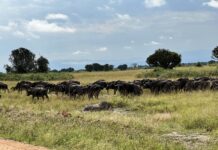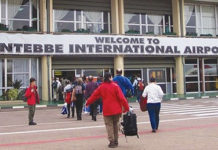Uganda’s rich biodiversity just got even more exciting. The Uganda Wildlife Authority (UWA) has announced plans to launch a chimpanzee habituation experience in Bwindi Impenetrable Forest National Park—a move set to transform this already world-renowned park into a dual primate tourism destination.
Why Bwindi? Isn’t It Just for Gorillas?
Not anymore.
Bwindi, a UNESCO World Heritage Site located in southwestern Uganda, has long been famous for its mountain gorilla trekking experiences. Tourists from across the globe come to catch a glimpse of the majestic, endangered gorillas that call this dense rainforest home. But now, the lesser-known but equally fascinating chimpanzee population in the Ngoto area of Bwindi is stepping into the spotlight.
What Is Chimpanzee Habituation?
Chimpanzee habituation is a long-term process where wild chimpanzees are gradually accustomed to the presence of humans—without altering their natural behaviors. It’s a critical step in making primate trekking safe and sustainable for both animals and humans. Once habituated, these chimpanzees can be visited by researchers and tourists under guided, eco-sensitive conditions.
Similar initiatives have already succeeded in Kibale Forest National Park, Kyambura Gorge, and Kalinzu Forest, offering year-round tourist access and helping fund conservation efforts.
What Makes Bwindi’s Chimpanzees Unique?
Unlike many other chimp populations, those in Bwindi have a rare behavior: they often nest on the ground rather than in trees. This quirk alone makes them incredibly valuable for scientific research and a unique attraction for nature lovers and primatologists.
A Community-Driven Conservation Effort
What makes this initiative particularly impactful is the involvement of local communities, including the indigenous Batwa people. UWA plans to train local residents as guides and conservation stewards, creating direct economic benefits while deepening environmental stewardship.
Even the Church of Uganda has thrown its support behind the project. Bishop Dan Zoreka of Kinkiizi Diocese pledged full cooperation in ensuring both spiritual and environmental wellbeing in the region.
Backed by Global Conservation Leaders
The Jane Goodall Institute, a leader in primate conservation, is partnering with UWA to bring its scientific and educational expertise to the project. “Chimpanzees share 98.8% of our DNA,” said JGI Uganda CEO James Byamukama. “Protecting them protects us.”
What’s Next?
As the project develops, tourists could soon have the chance to experience chimpanzee trekking in Bwindi—a park already hailed as one of Africa’s top nature reserves. Officials are calling for proper equipment, clear revenue-sharing guidelines, and continued community involvement to ensure long-term success.
Why You Should Add Bwindi to Your Bucket List
Whether you’re an ecotourist, conservationist, photographer, or simply a curious traveler, Bwindi is about to offer something no other place in the world can: the chance to encounter both gorillas and chimpanzees in one extraordinary, ancient forest. The fact that there has been a major investment in accommodation in Bwindi across all the tracking sectors also guarantees shelter to all classes of visitors.






